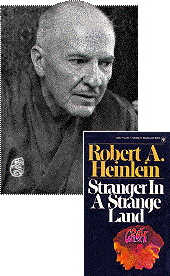July 7: Robert A. Heinlein
Robert A. Heinlein (1907)
It was on this date, July 7, 1907, that science fiction novelist Robert Anson Heinlein was born in Butler, Missouri, but shortly moved from Butler to Kansas City. He was one of seven children. Early on, he showed a keen interest in science, particularly astronomy – he saw Halley's Comet when he was three – and also in science fiction, reading Tom Swift books, Edgar Rice Burroughs, Jules Verne, and H.G. Wells.
Heinlein entered the US Naval Academy, graduating as an ensign in 1929, but on his second posting he developed pulmonary tuberculosis and washed out of the Navy. He would have health problems the rest of his life. Heinlein went back to school at UCLA, studying advanced engineering and mathematics, but his meager Navy pension, and a failure at politics, forced him into writing. By 1939 he had his first short story published in Astounding Science-Fiction magazine. Success followed shortly until, by the late 1950s, Heinlein was acknowledged as a master at science fiction story-telling.
His novels are full of skeptical, if not cynical, references to religion. Some titles had biblical references: Methuselah's Children (1958), The Number of the Beast (1979), and Job: A Comedy of Justice (1984) for example. Heinlein's skepticism is on display especially in his Lazarus Long-Future History series, and his famous novel about a Man from Mars, briefly titled The Heretic, but published as Stranger in a Strange Land in 1961, the year that it won a Hugo Award (the "Oscar" of science fiction)). Stranger in a Strange Land is described as "an amazingly iconoclastic and complex satire of sex and religion." The title character is a Christ-like figure and communion is compared to ritual cannibalism.
Heinlein's novels contain such aphorisms as:
I've never understood how God could expect His creatures to pick the one true religion by faith – it strikes me as a sloppy way to run a universe.
—Jubal Harshaw, Stranger in a Strange Land, 1961)Men rarely (if ever) dream up a God superior to themselves. Most gods have the manners and morals of a spoiled child.
—Lazarus Long, Time Enough For Love, 1973)The most preposterous notion that H. Sapiens has dreamed up is that the Lord God of Creation, Shaper and Ruler of all the Universes, wants the saccharine adoration of His creatures, can be swayed by their prayers, and becomes petulant if He does not receive this flattery. Yet this absurd fantasy, without a shred of evidence to bolster it, pays all the expenses of the oldest, largest, and least productive industry in all history.
—Lazarus Long, Time Enough For Love, 1973)Religion is a crutch for people not strong enough to stand up to the unknown without help.
—Lazarus Long, The Notebooks of Lazarus Long, 1978; excerpted aphorisms from Time Enough For Love, 1973)
Although he says nice things about the Mormon Church, and at one time considered becoming a Mason, the Methodist-reared Heinlein abandoned formal religion in his early teens. He died peacefully during a morning nap on 8 May 1988. Writing as himself, rather than as his alter-ego Lazarus Long, Heinlein said,
It is a truism that almost any sect, cult, or religion will legislate its creed into law if it acquires the political power to do so, and will follow it by suppressing opposition, subverting all education to seize early the minds of the young, and by killing, locking up, or driving underground all heretics.
—(Postscript to Revolt in 2100, 1953)
Originally published July 2003 by Ronald Bruce Meyer.


